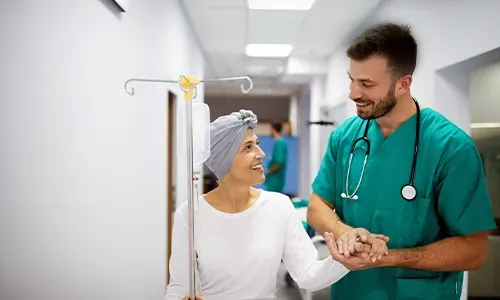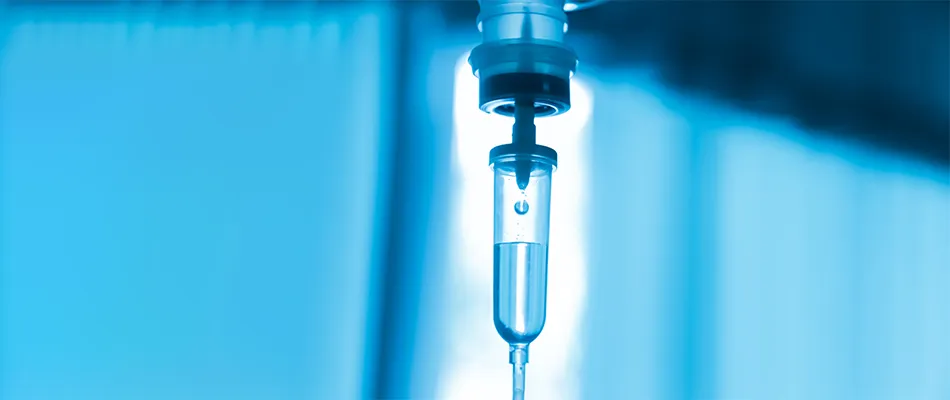- Chemotherapy
- Immunotherapy
- Targeted Therapy
- Palliative Care
- Day Care Centre
- Paxman Scalp Cooling
- Bone Marrow Evaluation
- Lymphapress
- Genetic Counselling
- Home Healthcare
- Clinical Research
- 2nd Opinion Clinic
- Psycho-Oncology
- Multi-Disciplinary Tumor Board-MDT
- Onco Nutrition
- Onco Physiotherapy
- Medical Tourism
- Yoga & Wellbeing
- Patient Support Group
- Crowd Funding


Chemotherapy
Chemotherapy employs drugs to eradicate cancer cells. With this specific cancer therapy, cancer cells
are prevented from multiplying, dividing, and generating new cells. A number of cancers can be
treated using chemotherapy. Your doctor may refer to chemotherapy as normal chemotherapy,
conventional chemotherapy, or cytotoxic chemotherapy.
The medicine chemotherapy has an overall body-wide impact. This implies that it circulates
throughout the body via the bloodstream. Chemotherapy comes in a variety of forms. Chemotherapy
drugs, in general, are strong chemicals that destroy malignant cells at specific stages of the cell
cycle. In all living things, new cells are produced by a process called the cell cycle. Chemotherapy
has a greater effect on these rapidly multiplying cells because cancer cells go through this cycle
faster than healthy cells.
Subtypes of therapy
- Adjuvant therapy: Chemotherapy is used as an adjuvant therapy to treat cancer following surgery or radiation treatment.
- Curative therapy: Chemotherapy, which may also include radiation and/or surgery, eradicates cancer and prevents its recurrence.
- Neoadjuvant therapy: Before surgery or radiation therapy, chemotherapy helps a tumor shrink.
- Palliative therapy: Cancer cannot be cured by chemotherapy, but it can decrease tumors and lessen symptoms.
Cancer treated with therapy
- Primary cancer- Cancer that has not spread to other parts of your body is referred to as primary cancer.
- Metastasized Cancer- Cancer that has metastasized means it has spread to other parts of your body.
- A number of variables, such as the location and stage of cancer, might affect how well a patient responds to chemotherapy.
Benefits of chemotherapy
- Chemotherapy may lessen the size of your cancer or halt its growth, extending your life and easing your symptoms.
- Chemotherapy may decrease certain patients with cancer that is on the verge of being surgically resectable, allowing for surgery to remove the malignancy.
- Following surgery, chemotherapy may lower the risk of the disease returning.
Downside of chemotherapy
- Different short-term and long-term adverse effects might result from chemotherapy.
- It can be exhausting to frequently visit the hospital for treatment, check-ups, and testing on various days.
- Chemotherapy has distinct effects on each individual and may not be as effective for some.
Chemotherapy treatment against cancer
Chemotherapy medications can be administered in a variety of methods, such as:
- Infusions of chemotherapy. Most frequently, chemotherapy is administered through a vein infusion (intravenously). A tube with a needle can be inserted into a vein in the arm or the chest to provide the drug.
- Tablets or pills for chemotherapy. There are pills and capsules available for some chemotherapy drugs.
- Chemotherapy injections. Chemotherapy medications can be administered intravenously, much like a shot.
- Creams for chemotherapy. Some forms of skin cancer can be treated using
creams or gels that contain chemotherapy medications.
chemotherapy drugs to treat a specific body part. Drugs used in chemotherapy can be administered directly to a body part. - Chemotherapy medications, for instance, might be administered directly into the belly (intraperitoneal chemotherapy), chest cavity (intrapleural chemotherapy), or central nervous system (intrathecal chemotherapy).
- Direct administration of chemotherapy to cancer. Chemotherapy can be administered either directly to the malignancy or to the surgical site where the tumor was removed.
Side effects of chemotherapy therapy
The negative effects you experience from chemotherapy will depend on the prescription medication or drug combination.
Various drugs cause side effects in different ways.
- Hair Loss
- Excessive Bleeding
- Loss of appetite.
- Nausea and vomiting.
- Constipation and diarrhea
- Breathing Issues
- Mouth Sore
- Hypersensitivity
- Weak immune system
Cancer medications are administered in chemotherapy therapy
More than 100 different medicines are used in chemotherapy for cancer. Despite the fact that all chemotherapy medications cause cell death, they target certain cell types at various points in the cell cycle. Combining medications that harm the cancer cell in several ways can improve the efficacy of the treatment.
- Alkylating agents
- Antimetabolites
- Anti-tumor antibiotics
- Topoisomerase inhibitors
- Mitotic inhibitors
- Plant alkaloids
Precautions while taking the chemotherapy
- After therapy, stay away from bodily fluid contact.
- Avoid going over your limits.
- Keep an infection at bay.
- If possible, use a separate toilet or sit down when using the toilet to lessen the danger of liquids splashing.
- Instead of hand washing, use a washing machine, warm water, and laundry detergent to clean your clothes, fabrics, and beds.
- Separately from other objects, wash any material that has been exposed to bodily fluids.
- Hands should be washed with warm water and soap, then dried with paper towels.
Post chemotherapy care
Getting care is crucial once cancer therapy is over. Your medical team can assist you in managing long-term side effects and keeping an eye out for emerging ones. The term for this is follow-up care. Regular physical exams, diagnostic procedures, or a combination of both may be part of your follow-up care.
Do’s & Don’ts during treatments
Do’s
- Keep yourself hydrated
- Maintain proper hygiene
- Apply sunscreen while going out
Don’ts
- Avoid large meals
- Avoid those who are contagious or have any infections.
- Avoid eating raw or undercooked food.
FAQ’s
- Can chemotherapy be used to treat cancer?
Yes. Chemotherapy can entirely cure some cancer types since they are sensitive to it. - Does receiving chemotherapy hurt?
Most patients don’t feel any pain while receiving treatment, especially if they’re taking tablets or using cream topically. When the needle is inserted for a shot or injection, you can experience an unpleasant sting or prick. - What stage of cancer receives chemotherapy
treatment?
The stage of cancer at which someone begins chemotherapy is not predetermined. There are several variables that affect the kind of chemotherapy medications you get, the dosage, and the timing of treatment.
Book Your Appointment








